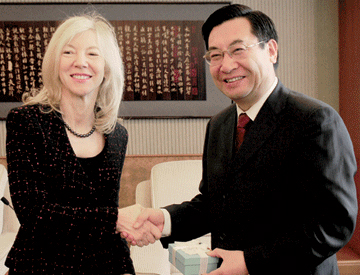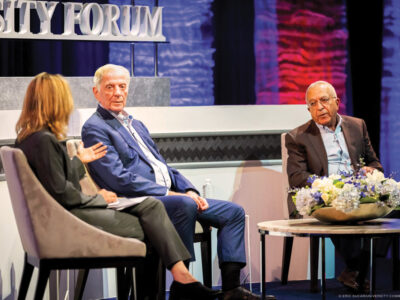
The ties that bind Penn and China are growing tighter.
By Amy Gutmann
Over the past several years, scores of colleges and universities have ramped up their global outreach efforts by building branch campuses all over the world. But there are other, more effective ways to bring Penn to the world, and the world to Penn. We are building partnerships with leading universities in order to accomplish three critical objectives: to foster mutual respect and understanding among the world’s future leaders; to maximize our capacity for grasping and solving complex problems, such as climate change, geopolitical conflict, and disease, which carry no passports; and to highlight and promote everything that Penn has to offer around the world.
No bilateral relationship has more bearing on the world’s future than that between the United States and China. And no institutions are better suited to strengthen that relationship than each country’s great teaching and research universities.
Penn and our partners at Tsinghua, Peking, Shanghai Jiao Tong, and Fudan universities of course cannot negotiate international agreements on security, trade, sustainability, and global health. Nonetheless, we can play a powerful role by contributing to genuine and lasting progress on these and other important fronts.
In March, a delegation of Penn faculty, deans, and senior administrators joined me for a week in China not only to fortify important academic partnerships, but also to strengthen our connections with our alumni and parents who are living there.
Our itinerary began, fittingly enough, with the U.S. Embassy and Ambassador Jon Huntsman Jr. C’87 hosting a reception for Penn alumni, parents, and friends. The ambassador’s welcoming remarks became a touchstone for our trip. He spoke in fluent Chinese for two minutes before reflecting in English on Penn’s history and our stakes in China.
The first Penn alumnus to serve as an American Ambassador to China was Thomas Gates Jr. C’28, succeeding George H.W. Bush in the mid 1970s. Gates, a decorated Navy officer in the Pacific theatre in World War II who later served as Secretary of Defense under President Eisenhower from 1959 to 1961, was also the son of Thomas Gates Sr.—Penn’s first president!
Ambassador Huntsman also provided a cool-headed assessment of U.S.-China relations, which he described as “sweet and sour … but more sweet than sour.” (You can enjoy his remarks at www.youtube.com.)
Our experience in China that week would prove to be all sweetness … and light. We held an all-day faculty symposium on sustainability at Tsinghua University, our partners in launching the TC Chan Center for Building Simulation and Energy, which is at the forefront of innovation in greener building designs. (Buildings currently account for half of the world’s carbon emissions.)
We examined the legal, business, and technological opportunities and challenges that the United States and China face in laying the groundwork for a more sustainable future. In his keynote address, Penn Law Dean Michael Fitts underscored the importance, as well as the inherently interdisciplinary nature, of our academic work with Tsinghua. “The critical questions facing the sustainability movement,” Dean Fitts said, “are not only how to formulate the best solutions, but how to implement these ideas throughout the world in different cultures and legal regimes. In the environmental context, those issues are inextricably linked: scientific developments impact the law while at the same time the regulatory system we adopt may stimulate new types of technological breakthroughs.”
To further encourage technological innovation, we launched the Global Technology Entrepreneurship Program, which will send up to 16 Penn Engineering students to work closely with students from Tsinghua on collaborative endeavors in energy and sustainability.
We spent the next day at Peking University (also known as Beida) for a “UPenn Day” symposium in recognition of our shared resolve to promote mutual understanding and progress through joint scholarly endeavors, particularly between our respective business and dental medicine schools. I delivered a lecture on the need for great universities to integrate liberal arts and professional education—an area where Penn excels and the direction that Beida’s leaders and faculty want to take. (To read the full text of my address, please go to www.upenn.edu/president/.)
Our symposium at Beida on international politics has catalyzed our plans to host a major international conference at Penn to examine U.S.-China relations. The conference will bring together leading scholars from Penn, our Chinese counterparts, and leading institutions in both countries with expertise in international relations, history, law, management, decision science, political communications, and political science. A conference of this scope can help to identify and evaluate potential instruments of diplomatic progress.
Finally, we went to Shanghai, where we met with Penn parents and presented our popular intellectual road show “Engaging Minds,” this time featuring Wharton Professor Eric Orts, the director of Penn’s Initiative for Global Environmental Leadership, and Penn Law Professor Jacques DeLisle, an eminent scholar on Chinese law and politics.
Current relations between the world’s leading economic superpowers are going through inevitable growing strains. Our trade relations and financial systems are closely intertwined, but our national interests also diverge. We have a lot to learn from one another. Who better than Penn and our Chinese partners to foster more mutual understanding, encourage more innovation, and better prepare our country’s future leaders to be knowledgeable and respectful of one another’s culture? We are not betting that we will educate leaders who solve all the world’s problems. Rather, our goal is to educate more mutually respectful and adaptable future leaders who are creative problem-solvers, as well as socially responsible members of their professions.
We shall begin by working together to translate our collaborative research into innovative ideas that address problems as important and far-ranging as climate change, national security, barriers to trade, and the volatility of global financial markets.
That is the spirit in which we laid the groundwork for progress going forward. Fortified by our productive partnerships with the most eminent Chinese universities, Penn’s prominence in China is far greater than ever. Should relations between the United States and China grow sweeter over time, don’t be surprised that Penn played a leading role in helping to make that happen.




